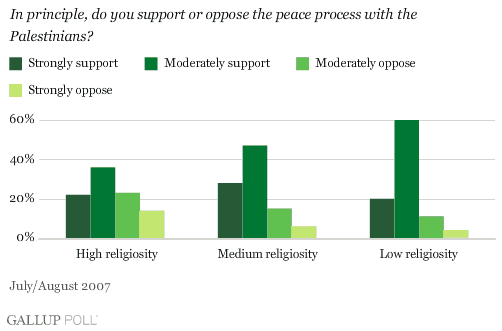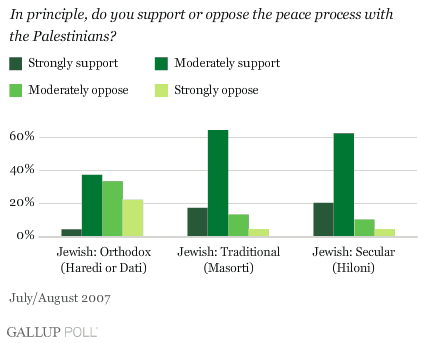This is the fourth installment in a series examining attitudes toward the peace process among Israelis and Palestinians.
WASHINGTON D.C. -- "We want peace," Israeli Prime Minister Ehud Olmert said in a speech at the U.S. Naval Academy during the peace summit in Annapolis, Md., last month. "We demand an end to terror, an end to incitement and to hatred. We are prepared to make a painful compromise, rife with risks, in order to realize these aspirations."
Olmert's words may not reflect the current mood of his entire constituency. A Ë┼├█┤ź├ŻPoll conducted in Israel in July and August 2007 finds a majority of Israelis support the peace process, but this support is down from polling conducted the previous year. Between the two polls, Israelis experienced a tough 2006 that saw Hamas elected to power in the Palestinian territories and a war in Lebanon that was trumpeted in the Arab world as a Hezbollah victory over Israel. (See "Support for Peace Shifts Among Israelis, Palestinians" in Related Items.)
These events may have heightened a sense of insecurity among many Israelis about their isolated status as a predominantly Jewish population in the heart of the Muslim world. Ë┼├█┤ź├ŻPoll results show a significant relationship between Israelis' likelihood to support the peace process and their level of involvement with their faith.
To gauge their religiosity, Ë┼├█┤ź├Żasked Israelis 1) whether religion is an important part of their daily lives, and 2) whether they've attended a place of worship or religious service in the last seven days. Results were used to categorize respondents into groups of "high religiosity" (those who answered "yes" to both questions, representing 29% of the population), "medium religiosity" (those who said "yes" to one question but not the other, 24%) and "low religiosity" (those who said yes to neither question, 47%). Looking at responses to the question about the peace process among these three categories reveals that just 59% of Israelis in the "high religiosity" group say they "strongly" or "moderately" support the peace process, compared with 80% those in the "low religiosity" group.

These findings conform with the results by religious denomination, which show that members of Israel's more devout Jewish movement -- those who describe themselves as haredi (ultra-Orthodox) or dati (Orthodox) Jews -- are the most likely to say they are opposed to the peace process. Those describing themselves as masorti (traditional) and hiloni (secular) Jews, on the other hand, are highly supportive of the process.

One way for Israeli leaders to broaden support for peace, then, may be to reconcile their call for a land-for-peace compromise with the Palestinians, with religious objections to yielding any territory at all in what they perceive to be the Jews' rightful homeland. Clearly that presents a difficult challenge with regard to the most conservative Jewish denominations -- but continually emphasizing the pragmatic benefits of peace (see "Israelis, Palestinians in Accord on Peace Benefits" in Related Items) with these groups may help soften potential resistance. The alternative is to strengthen grassroots public support for the peace process from the more liberal religious groups who are already more amenable to the process.
Survey Methods
Results from Israel are based on face-to-face interviews conducted July 15-Aug. 6, 2007, with a randomly selected sample of 1,001 Israeli residents, aged 15 and older. For results based on the Israeli sample, one can say with 95% confidence that the maximum error attributable to sampling and other random effects is ┬▒3 percentage points. In addition to sampling error, question wording and practical difficulties in conducting surveys can introduce error or bias into the findings of public opinion polls.
